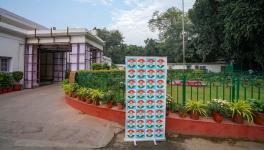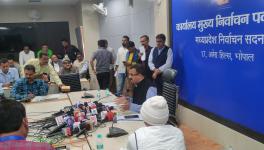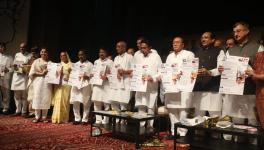MP Govt to Give 55L Water a Day to Each, Mulls Over Right to Water Act
Image for representational use only.Image Courtesy : The Indian Express
Bhopal: In a bid to deal with water crisis and ensure water to every citizen of the state, Madhya Pradesh government is drafting a Right to Water Bill. As per the proposed draft, every citizen would get 55 litres water per day and stringent laws will be framed to prevent wastage of water. Several media reports have highlighted the drying condition of rivers in the state due to the government’s apathy and illegal sand mining.
According to a government report, almost the entire state is in grip of water crisis since the inception of summer. Out of 52 districts, around 40 districts have been reeling under water crisis and depending on the water reservoirs including state capital Bhopal.
Aiming to get suggestions for the water bill, the Public Health Department of the state had organised a workshop of water scientists, experts and officials including waterman of India Rajendra Singh on Monday, June 24, at Bhopal’s iconic Minto Hall.
Speaking at the inaugural session, Magsaysay award winner Rajendra Singh lambasted the government, officials and citizens for this condition but appreciated the government’s idea of Right to Water law. He termed it as ‘a revolutionary idea.’
"Madhya Pradesh is a spoiled son of God, Rajasthan was a foster son therefore it didn't get spoiled. MP had water, but, it didn't value it while Rajasthan faced scarcity therefore treasured it," said Singh.
Also read: Water Wars Among Monkeys As Relentless Heat Dries Ponds in MP Forests
He pointed out that the engineers need to work with the conservators to implement the government’s schemes properly. “They fit taps on the supply line but they don't know how to bring water in that line. Engineers (of PHE department) should first learn water conservation from water scientists and should learn to work with scientists,” he added.
He also said that instead of giving contracts for water projects, government should chose community participation as “contracts would spoil the efforts leading to corruption but community participation would make it a success”. Before making any such Water Bill, the government should launch a mass movement to connect the people and make them aware about water scarcity and water conservation.
Water Conservation in School and College Curriculum
During the day-long convention on Right to Water in the state, experts also urged the government to initiate efforts for water conservation on an urgent basis. Singh also said, “Like many other states in India, MP had been heading towards a severe water crisis for a long time. But we all want to exploit water resources, hardly anyone wants to conserve it. There is an urgent need to make people water-literate.”
Public Health Engineering Department (PHED) minister Sukhdeo Panse, who attended the convention said, “Only when the issue is linked with the primary, middle and secondary education school and college curriculum, the children and youth will be able to understand the seriousness of the issue of water conservation. Water conservation will then become a habit for them. The rate at which the water bodies have been shrinking in the summers and the water table is consistently going down, conservation of lakes and ponds is the need of the hour.”
Panse assured that before making the right to water a law, the government would consult the subject experts, educationists and legal experts. Besides, the people’s opinion would also be taken into consideration before enacting the law. In India, Right to Water is a part of the Right to Life ensured under Article 21 of the Indian Constitution and Madhya Pradesh would be the first state in the country to take this initiative, he added.
Jal Sansad
Panse said that this workshop is the first step towards formation of the Right to Water Act. “We are trying to ensure that this becomes a public movement and not only an Act. Everybody has to come forward to save water,” he said, adding, “Several perennial rivers, lakes and other sources of water have dried up due to encroachment. All encroachments will be removed. Government will take care to encompass all these factors in the Act.”
Also read: Close to 4,000 Madhya Pradesh Villages Stare at Acute Drought
After this workshop a Jal Sansad- public programme will be organised where public suggestions will be invited, he added. About 100 water experts who have done commendable work in water conservation were present in the programme, including Akihiro Natori, a water consultant from Japan who is working in Mandsaur and adjoining areas.
CM Nath Calls upon youths to work as Jal Doot
After promising the Right to Water, the state government has formed a Water Cell dedicated to work on intricacies related to Act. Responsibility of the water cell has been entrusted to secretary level officer. Citizens can email their suggestions regarding water conservation to [email protected].
Yuva Shakti Committees will be formed to engage youth for water conservation. Nath said that youths of the state will work as Jal Doot - conserving water and water resources. He has urged the youth to do all necessary work together to conserve rain water at the village level itself in this monsoon. Instead of big schemes, focus on small but important works related to ponds, check dams, percolation ponds on farmsponds, construction of boundaries and well recharge will be taken up in rural areas. The Chief Minister has urged affluent farmers to themselves take up works of ponds and ground water recharge on their farms at their own cost.
Nath said that arrangement of sufficient fund has been made in various government schemes for water conservation by the state government. CM has urged all the MPs and MLAs that they should use their fund on water conservation works at large scale.
The Chief Minister had also contended that the Right to Water Act will be instrumental in ensuring requisite quantity of water to urban citizen. He said this while reviewing the future plans of the Urban Development Department. The state has 2,400 lakes and water reservoirs and their longevity depends on the catchment area. The government will cover the catchment area projection under the water act.
Get the latest reports & analysis with people's perspective on Protests, movements & deep analytical videos, discussions of the current affairs in your Telegram app. Subscribe to NewsClick's Telegram channel & get Real-Time updates on stories, as they get published on our website.
























